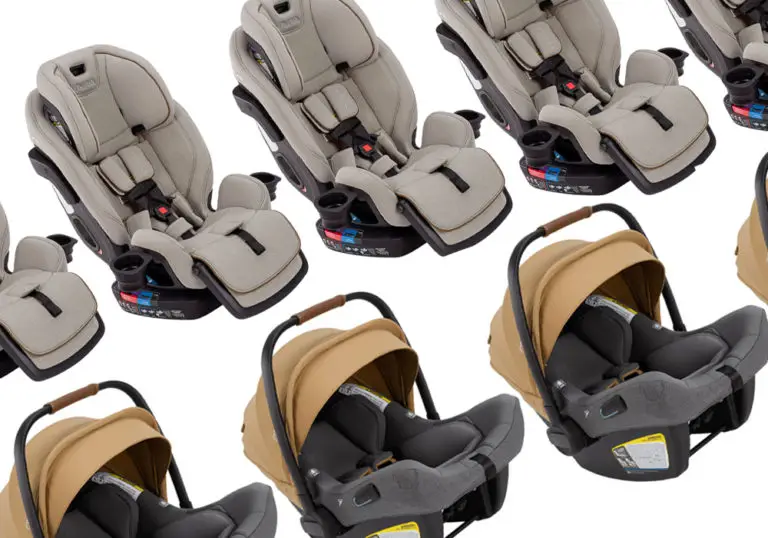North Carolina Car Seat Laws 2024 (Rear, Forward & Booster)

As per North Carolina car seat laws, a child passenger under 8 years of age and weighing less than 80 pounds must be secured in an appropriate child restraint system.
It should meet the applicable federal safety standards at the time of its manufacture. The driver will be responsible for any violation of the law.
Disclaimer: This content does not constitute legal advice. It is solely for informational purposes. We recommend you check the original source of the law for the latest version.
- NC Rear-Facing Seat Law
- NC Forward-Facing Seat Law
- NC Booster Seat Law
- NC Child Front Seat Law
- NC Child Seat Belt Law
- NC Taxi Child Seat Law
- NC Ridesharing Seat Law
- NC Child Seat Repl. Law
- Leaving Child in Car in NC
- Choosing a Child Seat in NC
- Seat Installation Help in NC
North Carolina Car Seat Laws
North Carolina Rear-Facing Car Seat Law
There is no specific rear-facing car seat law in North Carolina. According to North Carolina state law, all children under 8 years and weighing less than 80 pounds must be secured in an appropriate child restraint system. (1)
In the absence of a North Carolina rear-facing child seat law, it is best to follow the guidelines of the American Academy of Pediatrics (AAP). These state that babies should be placed in an infant rear-facing seat.
The rear-facing car seat age in North Carolina is not mentioned in the law. But the AAP recommends that children ride rear-facing till they are 2 years old. The driver will be held responsible for any violation. They may be fined a maximum of $25 with two points assessed to their driver’s license.
Age: Younger than 8 years (Newborn to 2 years recommended)
Penalty: Maximum $25
North Carolina Forward-Facing Car Seat Law
There is no forward-facing car seat law in North Carolina. However, the National Highway Traffic Safety Administration (NHTSA) recommends that children must ride forward-facing after they have outgrown the height or weight limits of their rear-facing seats.
Under the North Carolina car seat regulations, children younger than 8 years and weighing less than 80 pounds must be placed in a child restraint that meets federal safety standards. (1) For young children aged 2 to 4 years, this means a forward-facing car seat with a harness and tether.
A definite forward-facing car seat age in North Carolina is absent. But it is best if children ride forward-facing till they outgrow them. A breach of North Carolina forward-facing child seat law will result in a maximum $25 penalty to the driver.
Age: Younger than 7 years (2 to 4 years recommended)
Weight: Less than 80 pounds
Penalty: Maximum $25
North Carolina Booster Seat Law
According to the child booster seat law in North Carolina, all children under 8 years of age and weighing less than 80 pounds must be secured in a child restraint/booster seat. (1) The booster seat age in North Carolina is not specific. Children who have outgrown the height and weight limits of their forward-facing seats can ride in booster seats.
A high back or backless booster seat must be secured with a lap and shoulder belt. If there is no seating position with a lap and shoulder belt, a child younger than 8 years and weighing between 40 to 80 pounds can be restrained by a lap belt only.
North Carolina booster seat requirements do not apply to ambulances or other emergency vehicles or to vehicles that are not required under federal law to have a seat belt. Not following the law carries a maximum penalty of $25.
Age: Younger than 8 years
Weight: Less than 80 pounds
Penalty: Maximum $25
North Carolina Child Front Seat Law
According to the child front seat law in North Carolina, a child less than 5 years of age and less than 40 pounds must be placed in a rear seat if the front seat of the vehicle has a passenger-side airbag.
However, they can sit in the front seat if their child restraint can be used with airbags. (1)
The front seat age in North Carolina is 5 years and more than 40 pounds. But the AAP recommends that children ride in the backseat till they are 13 years old.
If riding in front, they must be secured in a car seat that is appropriate for their height and weight. The vehicle seat must be pushed as far back from the airbag as possible.
Disobeying these requirements will entail a maximum fine of $25.
Age: 5+ years
Weight: 40+ pounds
Penalty: Maximum $25
North Carolina Child Seat Belt Law
According to the child seat belt law in North Carolina, every child passenger between 8 to 16 years of age must be secured in a seat belt. (1) This is regardless of whether they are in the backseat or the front seat.
Children who weigh at least 80 pounds (regardless of age) can use an adult safety belt if it fits them properly. Generally, a lap and shoulder belt fits a child when they are at least 4’9” tall.
North Carolina children’s seat belt law does not apply to cars manufactured before 1968 and light trucks and vans made before 1972. They also do not apply in case of a certified medical condition.
The driver will be responsible for children not wearing seat belts. Any violation of the requirements of seat belt rules in North Carolina will result in a maximum fine of $25 to the driver.
Age: 8 to 16 years
Weight: 80+ pounds
Penalty: Maximum $25
North Carolina Taxi Child Seat Law
According to the taxi child seat law in North Carolina, taxis have to comply with the car seat laws. As per the University of North Carolina Highway Safety Research Center, taxis are required to have a federally approved child passenger restraint system.
The driver is responsible for providing a taxi child seat in North Carolina for all children under 8 years of age and weighing less than 80 pounds. (1) A violation will result in a fine of a maximum of $25 and two points assessed to their license.
Hence, taxis must have a car seat that is appropriate for the child’s age and weight. It can be a rear-facing, forward-facing, booster, or all-in-one seat. It must be installed safely according to the manufacturer’s instructions.
North Carolina Ridesharing Child Seat Law
The ridesharing child seat law in North Carolina is unclear. North Carolina child seat laws require kids younger than 8 years and weighing less than 80 pounds to be placed in an appropriate car seat. (1) However, there is no mention of ridesharing services such as Uber or Lyft.
The responsibility of ensuring that children are safely secured rests with the driver. The best option, in this case, is for either the driver or the parents/caregivers to provide a child seat. Infants should be placed in a rear-facing car seat.
Young children up to 4 years old should ride in a forward-facing car seat. From 4 through 7 years, they should ride in a booster seat till the safety belt fits properly across their lap and shoulders.
North Carolina Child Seat Replacement Law
There is no child seat replacement law in North Carolina. However, a car seat should be replaced after it is involved in an accident or has expired.
The NHTSA recommends child seat replacement after an accident, especially after a moderate or severe crash. In case of a low-impact accident, there is no urgent need to replace the child safety seat.
A low-impact crash is where no passenger is injured, the door nearest to the car seat is not damaged and the seat itself shows no visible damage.
Apart from replacing the seat after an accident in North Carolina, you must also replace it after it has expired. It must not be used beyond the period stated by the manufacturer. If the seat has been recalled, then too you should replace it.
Leaving Child in The Car in North Carolina
There is currently no law on leaving a child in a vehicle in North Carolina. However, leaving a child unattended in a vehicle is extremely dangerous. The most common danger is heat stroke.
The temperature inside the vehicle can rise rapidly. Since children’s bodies heat up 3 to 5 times faster than adults, they are at great risk of suffering a heat stroke. There are other dangers too. The child can get kidnapped, set the car in motion, get strangled by seat belts or power windows or have some other in-car accident.
Even though the law does not address the issue of leaving a child in a car in North Carolina, the culprit may still face criminal charges under the laws of child endangerment. Thus, you should never leave your child alone in a car, even for a minute.
Choosing a Child Car Seat in North Carolina
The broad nature of car seat laws in North Carolina allows you to choose the best-suited car seat for your child. You can follow the NHTSA recommendations when choosing a car seat in North Carolina.
From the time your child is born till they turn at least 2 years old, a rear-facing car seat is the best car seat to use in North Carolina. They can then move to a forward-facing seat.
After they outgrow these, they should use booster seats. A high-back or backless seat is the best booster seat to use in North Carolina.
Whichever car seat you choose, it must meet federal safety standards.
Car Seat Installation Help in North Carolina
Child passenger safety seats in North Carolina must be secured perfectly to ensure the safety of your child. It can be a complex task to follow instructions from the manual.
There are different stations with certified Child Passenger Safety (CPS) technicians.
You can get your car seat checked or installed and also learn more about child passenger safety. Some of the stations where you can get assistance with car seat installation are:
- Wilson Fire Department
- Wake County Child Passenger Safety Program
- Winston-Salem Police Department
- Mebane Fire Department
- Alexander County Sheriff’s Office
- University of North Carolina Police Department
- Durham Fire Department
North Carolina Car Seat Safety Resources
- Buckle Up NC: An initiative of the University of North Carolina Highway Safety Research Center, it provides resources about child seat requirements in North Carolina and seat belt laws. It works towards encouraging and implementing transportation safety.
- Office of State Fire Marshal- Child Passenger Safety:
- WakeMed: WakeMed Health and Hospitals is a leading healthcare provider. It also has vital information about selecting the right car seat and general car seat safety.
- NC Vision Zero: A road traffic safety project, the North Carolina program works with engineers, emergency responders, educators, and law enforcement to make the streets of North Carolina safe for all.
FAQ
How long should a child ride in a rear-facing car seat in North Carolina?
The law does not expressly state an age. But it is recommended that a child ride in a rear-facing car seat till the age of 2 years.
Can you put a rear-facing car seat in the front seat in North Carolina?
You can put a rear-facing seat in the front seat only if the rear-facing seat is designed for use with an airbag. Ideally, the front seat airbag must be deactivated.
Can you put a rear-facing car seat in the middle rear seat in North Carolina?
You can put a rear-facing car seat in the middle rear seat, but it must fit properly. Check the car seat as well as your vehicle’s manuals.
When can a baby face forward in a car seat in North Carolina?
There is no specific requirement. But children can face forward after they have outgrown their rear-facing seat. This typically happens around 2 years of age.
How old for a booster seat in North Carolina?
There is no specific age mentioned in the law. But children should ride in a booster seat once they outgrow their forward-facing seat according to its manufacturing limits.
When to use a backless booster seat in North Carolina?
You can use a backless booster seat if your vehicle seat has a headrest and the child’s ears are not higher than the seat back.
When can a child sit in the front seat with a booster in North Carolina?
A child can sit in the front seat with a booster if they are older than 5 years and weigh more than 40 pounds. However, children should ideally ride in the backseat till the age of 13.
When can a child stop using a booster seat in North Carolina?
A child can stop using a booster seat when they turn 8 years old or weigh more than 80 pounds. They can then start using the seatbelt.
When can a child sit in the front seat in North Carolina?
Children older than 5 years and weighing more than 40 pounds can sit in the front seat. However, they are safer in the backseat and should ride there.
When to switch from 5 point harness to a seat belt in North Carolina?
When the child outgrows the height and weight limits of the 5-point harness, they can switch to wearing a seat belt in a booster seat.
When can a child use a regular seat belt in North Carolina?
Under the law, a child can start using a regular seat belt once they are 8 years old and weigh more than 80 pounds.
Do you need a car seat in a taxi in North Carolina?
Yes, you need to have a car seat in a taxi in North Carolina. Taxis are not exempt from the law. The driver will be held responsible for any violation.
Do you need a car seat in a Uber in North Carolina?
The law is silent on this issue. But either the caregiver or the driver should provide a federally approved car seat that is appropriate for the child’s age and weight.
Do you need a car seat in a Lyft in North Carolina?
The law is not clear on this issue. But either the caregiver or the driver should provide an appropriate car seat to ensure the child’s safety.

Rishima Rawat
Rishima Rawat is a lawyer and legal writer with over six years of writing and legal experience. She earned her LLB degree from the West Bengal National University of Juridical Sciences, Kolkata. With a passion for child safety, she’s written extensively about the U.S. car seat laws in ParentingMode. She collaborates with businesses and law firms globally, enhancing their online content. Her insights are also published in legal journals like RGNUL, NLIU, and RMLNLU Law Review. Committed to the cause of education, she has volunteered with IDIA, which helps underprivileged children in India to access legal education. She has also worked with Enhelion Knowledge Ventures, a leading legal ed-tech platform in India that provides students with affordable courses in law. Fluent in English and Hindi with elementary proficiency in Spanish, Rishima combines her legal expertise with a dedication to child safety.






